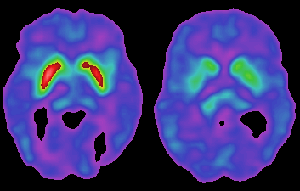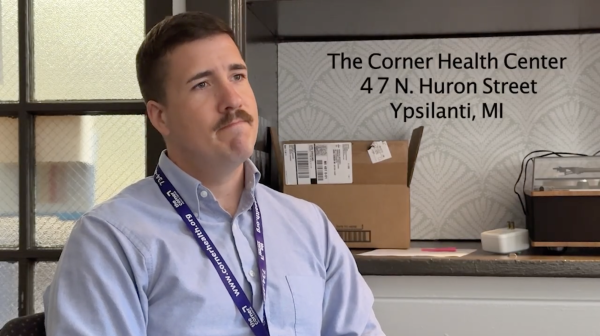Parkinson’s Disease

Dopamine levels in the brain from normal levels to Parkinson’s affected levels (left to right)
In the midst of Ebola, influenza and other infectious diseases, one infects over 10 million people worldwide.
It is not passed through spit, snot or blood. It might be genetic. It is Parkinson’s Disease.
Parkinson’s Disease is caused by the loss of neurons in the brain that produce dopamine. With the loss of dopamine comes the loss of movement coordination. The disease is progressive– it gets worse as time goes on. Medical and indirect expenses are around $10.8 billion in the US, and that value is increasing.
The main way to diagnose Parkinson’s is by looking at symptoms. Common symptoms include tremor, slowness of movement, rigidity and trouble balancing. Because brain-invasive treatments are not possible yet, molecular-level diagnoses cannot be made without brain tissue samples and patients are evaluated and diagnosed based on symptoms alone.
Currently, it is incurable.
Dr. Roger Albin, professor of Neurology at the University of Michigan, is looking for changes in the brain that are responsible for the different abnormalities that occur in Parkinson’s.
“I think people need to know that it is quite a common disorder; it’s primarily a disorder of older people,” he says. “We can treat certain aspects of Parkinson’s Disease fairly well but there are a lot of aspects that we don’t have good treatments for.”
A defining feature of the disease is the buildup of abnormal clusters of protein called Lewy bodies in the substantia nigra, the main dopamine-producing region of the brain. Of the proteins found in Lewy bodies, alpha-synuclein has been indicated as the most important.
Regarding a cure, Dr. Albin has some ideas to make therapy better. “There are two major avenues. There are genetic forms. Some of those genes have been identified and figuring out what goes wrong when those genes are abnormal is a way,” he says. “The other way is to look at brains of people with Parkinson’s and see how they are different than healthy individuals. That helps with more useful therapy.”
“Eventually my participation was impossible, it became physically uncomfortable for me; the comments had diminished, although I did not mind them, things had became very awkward for them. As time passed, it had become obvious that their ability to socially deal with my PD had become a challenge, a challenge that few would chose to confront. As with family and friends, it had mostly become easier to ignore than to accept,”Franco Canale, someone who has had Parkinson’s for over 4 years, says on the National Parkinson’s Foundation Website. “I soon came to realize that I was no longer ‘normal’.”
The disease is striking many people until they have cognitive impairment or problems with memory and thinking. “It’s a progressive illness and regardless of what we do people worsen over time,” Dr. Albin concludes. Many people and groups are working to finding a cure, and hopefully that will be soon.








